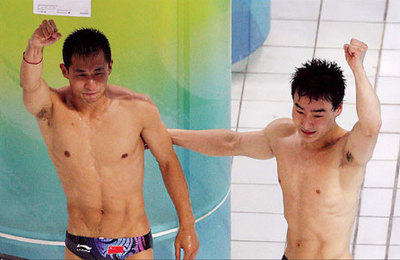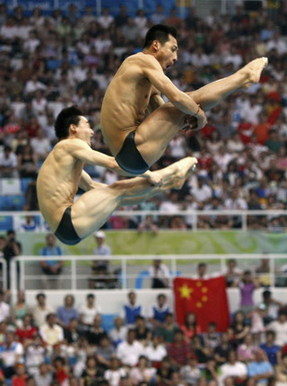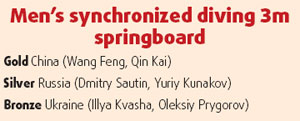Chinese divers Qin Kai and Wang Feng consolidated their country's supremacy in the sport with its fourth diving gold in the men's synchronized springboard Wednesday.
The duo leapt ahead of the rest with a belly-whopping 469.08 points, more than 50 points over silver medalists Russians Dmitry Sautin and Yuriy Kunakov.
Ukrainian pair Illya Kvasha and Oleksiy Prygorov took the bronze with 415.05.
 China's Wang Feng (left) and Qin Kai celebrate their gold in the men's synchronized 3m springboard at the National Aquatics Center Wednesday. [Agencies]
China's Wang Feng (left) and Qin Kai celebrate their gold in the men's synchronized 3m springboard at the National Aquatics Center Wednesday. [Agencies] |
"We managed a good synchronization today and since we have teamed up for a long time, we had no worries at all before the competition and just did our best to win," said the 29-year-old Wang, who is currently the oldest member of the Chinese diving team.
"If my body allows it, I will try to compete in another Olympics."
Wang and his 21-year-old partner seized the lead with their first back dive, for which they achieved three maximum 10 scores. They continued to widen the gap and secured the gold after their fourth dive, a difficult two-and-a-half forward somersault in pike position, well ahead of the second pair by over 20 points.

Wang Feng and Qin Kai of China compete in the men's synchronised 3m springboard diving final at the National National Aquatics Center during the 2008 Beijing Olympics August 13, 2008. [Agencies] |
After the victory ceremony, second-time Olympian Wang, who finished fourth on the 3m springboard at Athens, presented the flowers to his wife, who was cheering for him on the stands, and kissed her.
The Chinese pair's win regained their country's domination of the 3m springboard, which it had lost in Athens four years ago.
China's diving dream team had been holding onto bitter memories of the same event in the 2004 Games, when Peng Bo and Wang Kenan blundered in their final dive and were not awarded any points.
The gold slipped out of their hands to Greek duo Thomas Bimis and Nikolaos Siranidis after a series of mistakes by other divers, leaving the Chinese in last place.
As the China duo reclaimed top spot Wednesday, Russian diving legend Sautin and his 18-year-old partner trailed them closely in the first four dives, but slumped to fourth after their fifth performance, a difficult inward three-and-a-half somersault in tuck position.
They managed to salvage the situation in the final decisive battle and stepped on the podium with the silver.
It was Sautin's second silver in his fifth Olympics. The 34-year-old veteran has earned a total of seven medals at four previous Games, including two gold, one silver and four bronze medals.
"I was considering retirement after the Athens Games," he said. "But I had a new partner from 2006 and I made a promise to compete in Beijing. I'm very happy to have performed well here. It was an exciting and interesting final."
He admitted that the Beijing Games will be his last.
"Lots of Chinese divers have rotated and I have kept up and it's not good to do that," he said. "My health does not allow me to do what I would like to do So, it will be my last Olympic Games."

The Ukrainian pair, which was placed last out of the eight pairs after the second dive, pulled ahead from their third plunge Wednesday.
After a final reverse three-and-a-half somersault in tuck position, they were delighted to secure a bronze medal.
"The medal is very important for us," said a delighted Kvasha. "We had full confidence in ourselves when we dropped behind, and believed we could bring back a medal."